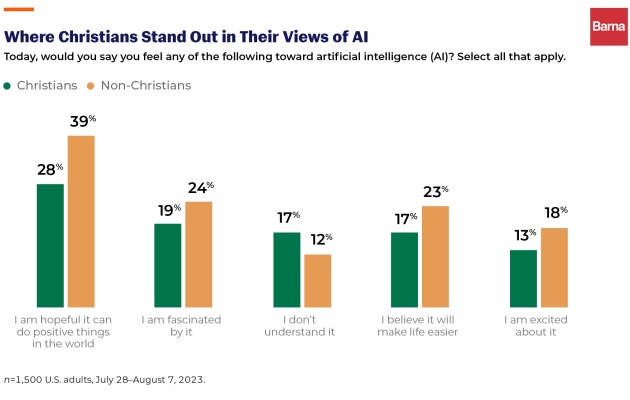“This scepticism should encourage churches to evaluate Artificial Intelligence carefully and responsibly”, conclude the authors of a survey in the US.
![More than half churchgoers would be disappointed if their church used AI, found survey in the US. / Photo: [link]Charles Deluvio[/link], Unsplash, CC0.](https://cms.evangelicalfocus.com/upload/imagenes/65685f275ed10_6567651b1c22c_1.jpg) More than half churchgoers would be disappointed if their church used AI, found survey in the US. / Photo: [link]Charles Deluvio[/link], Unsplash, CC0.
More than half churchgoers would be disappointed if their church used AI, found survey in the US. / Photo: [link]Charles Deluvio[/link], Unsplash, CC0.
Christians have less confidence in Artificial Intelligence (AI) than non-Christians, found a survey conducted by the Barna Group, in partnership with Gloo, a technology platform for ministry leaders.
After asking members of evangelical churches in the United States, researchers found that 51% of respondents said they do not believe the two should ever be linked.
The same proportion, 52%, say they would be disappointed if they knew their own congregation was using such technology. On the other side, 22% believe that Artificial Intelligence can have a good use in the context of church, although only 6% expressed that opinion with absolute conviction.
The findings are based on an online survey of 1,500 adults in mid-2023 with representation distributed by region, race/ethnicity, age and gender, according to US census.

[photo_footer]Graph source: Barna Group [/photo_footer] Only 28% of Christians (28%) said they were hopeful that AI can do positive things in the world, compared to 39% of non-Christians.
One in four believers said they don’t know whether the church should use AI, which could indicate that a sizable share are still making up their minds about the newest tehcnologies available.
Among Christians, 19% said they were fascinated by AI, compared to a higher 24% of non-believers.
While 17% of Christians responded that they do not understand Artificial Intelligence, it was 12% of non-Christians who said the same.
In light of these results, Gloo (a company focused on church life and technology) stated that the scepticism among Christians in the US should encourage churches to evaluate AI carefully and responsibly. As in other areas, they said, Christians have to explore how AI can be used for good and godly purposes that serve people and communities.
[analysis][title] Fear of the AI future [/title][photo] 
[/photo]
[text]
Charlie Catlett, a computer scientist who helped start the internet decades ago, told Evangelical Focus about the dangers and opportunities he saw in the latest Artificial Intelligence developments.
“I think there’s a sense of unease because we don’t know what’s going to come out next. We will see more remarkable things come out, but I don’t think that we’re going to see this level of disruption as a steady state from here out”, Catlett said. And added: “We worship a God who’s in control of the universe, and nothing that we create is going to be any match for that God”.
In Germany, experiments to produce the full content of a religious service with AI raised both curiosity and rejection.
[/text][/analysis][donate]

Las opiniones vertidas por nuestros colaboradores se realizan a nivel personal, pudiendo coincidir o no con la postura de la dirección de Protestante Digital.
Si quieres comentar o